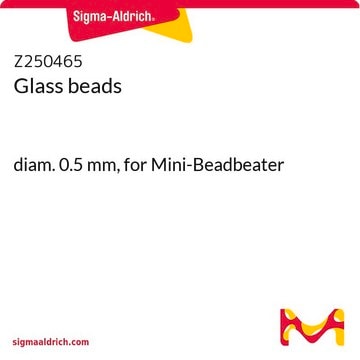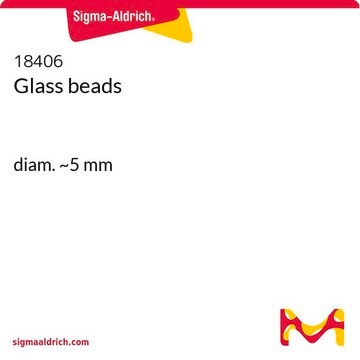G1152
Glass beads, acid-washed
710-1,180 μm (16-25 U.S. sieve)
Synonyma:
Glass Beads
Přihlásitk zobrazení cen stanovených pro organizaci a smluvních cen
About This Item
UNSPSC Code:
41102422
NACRES:
NB.22
Doporučené produkty
particle size
710-1,180 μm (16-25 U.S. sieve)
Application
Acid-washed glass beads have been used:
- in the extraction of proteins from antigen-expressing transgenic lines of Nicotiana tabacum L.
- to extract DNA of Candida albicans from human and murine blood samples
- to measure lipid yield from microalga C.homosphaera by adopting different methods of cell disruption methods
Storage Class
11 - Combustible Solids
wgk_germany
nwg
flash_point_f
Not applicable
flash_point_c
Not applicable
ppe
Eyeshields, Gloves, type N95 (US)
Osvědčení o analýze (COA)
Vyhledejte osvědčení Osvědčení o analýze (COA) zadáním čísla šarže/dávky těchto produktů. Čísla šarže a dávky lze nalézt na štítku produktu za slovy „Lot“ nebo „Batch“.
Již tento produkt vlastníte?
Dokumenty související s produkty, které jste v minulosti zakoupili, byly za účelem usnadnění shromážděny ve vaší Knihovně dokumentů.
Zákazníci si také prohlíželi
Novel strategy for microalgae cell disruption and wet lipid extraction by employing electro-Fenton process with sacrificial steel anode
Wanniarachchige P, et al.
Bioresource Technology (2022)
Continued expression of plant-made vaccines following long-term cryopreservation of antigen-expressing tobacco cell cultures
Van E J and Keen P.
In Vitro Cellular & Developmental Biology. Plant, 45(6), 750-757 (2009)
Evaluation of a digital microfluidic real-time PCR platform to detect DNA of Candida albicans in blood
W. A. Schell
European Journal of Clinical Microbiology & Infectious Diseases : Official Publication of the European Society of Clinical Microbiology (2012)
Katarina Damjanovic et al.
Microbial ecology, 79(3), 706-719 (2019-08-23)
Coral-associated bacteria are critical for the well-being of their host and may play essential roles during ontogeny, as suggested by the vertical transmission of some bacteria in brooding corals. Bacterial acquisition patterns in broadcast spawners remain uncertain, as 16S rRNA
Sarah L Sokol et al.
eLife, 7 (2018-05-23)
Most eukaryotic parasites are obligately heteroxenous, requiring sequential infection of different host species in order to survive. Toxoplasma gondii is a rare exception to this rule, having a uniquely facultative heteroxenous life cycle. To understand the origins of this phenomenon
Náš tým vědeckých pracovníků má zkušenosti ve všech oblastech výzkumu, včetně přírodních věd, materiálových věd, chemické syntézy, chromatografie, analytiky a mnoha dalších..
Obraťte se na technický servis.












